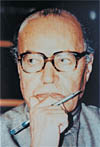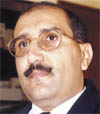Salwa Sharafi, Journalism Professor to the Yemen Times: “I have been amazed to see young Yemeni journalists who have bold and daring ideas and writings” [Archives:2002/40/Interview]
Yemen Times in collaboration with Friedrich Ebert Stiftung organized a workshop titled “Press Coverage of Election ” on September, 14_18, 2002.
Yemen Times reporter, has met up with Dr. Salwa Sharafi, the workshop trainer and Journalism Professor, Press Institute, University of Tunis and filed the following interview.
YT: How do you assess the Yemeni press with regard to handling the national issues?
A: If we draw a comparison between the Yemeni press and the Arab press, we will find that the Yemeni press is distinguished among the Arab press in that of content and multi-opinion. There are actually several daring writings and articles I have never seen alike in countries like, Jordan, Morocco, and Egypt.
Yemen is the only country where the political plurality is widely practiced. As for the design and outline, the Yemeni press of course is in short of financial support.
YT: How do you personally appraise the Yemeni journalist and his awareness towards his issues?
A: I’m very deeply impressed by the freedom of press here in Yemen. I have been also amazed to see young Yemeni journalists who have bold and daring ideas and writings. They are courageous and open-minded in their writings where they deal with heated subject matters.
YT: What is the leading role of the media towards the development issues?
A: As a journalist, one the main reasons behind our backwardness is the role of the media. Undoubtedly, the media play a pivotal role in educating people in order to be tolerant and to respect other’s opinions. Consequently, people will not go against each other. Media’s role is indispensable. What can be said on the role of the media is that without stability, there will not be development.
YT: As a human rights activist, what have the human rights organizations achieved so far? Are these organizations independent?
A: Of course, most of these organizations are independent. I want to emphasize that the human rights organizations have fallen prey to harassment. As a human rights activist, you have to be credible in issuing reports. If this organization or that is honest in issuing the flagrant violations, which is of course a very difficult mission, it should be reported credibly.
But the question which poses itself is, is there a positive response on the part of the Arab leaders?
YT: How do you assess the Arab woman’s participation along with man?
A: As a female journalist, the career of journalism has left a special effect on me. I was entrusted with several missions in several war fronts. I have faced so many troubles and harsh experiences with a view of conveying the message to the readers. This is the best thing that a woman can do. The Arab woman can do other things where a man is not able to do.
Man has engrossed in arms types and military strategies. Women on the other hand, have fallen prey to the social catastrophes as a result of wars.
The man has remained the only person who controls every thing. What is needed is that a woman should be respected considering her as a main factor in building the society.
YT: What is your impression during your visit to Yemen?
A: My visit to Yemen is very too short. I’ve been deeply fascinated by the Old City of Sana’a which is parallel to One Thousands Night and One. When I first had started standing before Gate of al-Yemen, (Bab al-Yemen), I thought that the time has stopped. But it is stopped in a very wonderful way. I have heard about Yemen’s good reputation and its antiquities.
Frankly speaking, what adds to the beauty of Yemen are the people, their courtesy and their polite behavior.
——
[archive-e:40-v:2002-y:2002-d:2002-09-30-p:./2002/iss40/intrview.htm]


